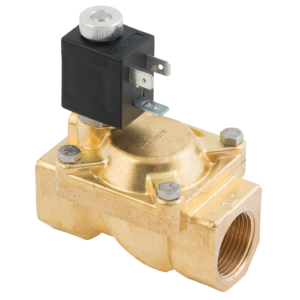Solenoid Valves for On / Off Control
Have you ever wondered how certain machines and systems are able to turn on and off with precision? The answer lies in solenoid valve systems.
What is a Solenoid Valve?
A solenoid valve is a device that controls the flow of fluids or gases through a system. Solenoid valves can be used in a variety of applications, such as controlling the flow of water, air, or oil in industrial processes. They are also commonly used in irrigation systems, air conditioning units, and refrigeration systems.
How Does a Solenoid Valve Work?
When an electric current is applied to the coil of a solenoid valve, a magnetic field is created. This magnetic force pulls a plunger or piston, which opens or closes a valve, allowing or blocking the flow of fluid or gas.
The solenoid valve consists of two main parts: the coil and the valve body. The coil contains a wire wrapped around a core, which creates a magnetic field when an electrical current passes through it. The valve body contains an inlet and an outlet port, a plunger or piston, and a seal. When the solenoid valve is energised, the magnetic force pulls the plunger or piston away from the seal, allowing the fluid or gas to flow through the valve. When the solenoid valve is de-energized, the plunger or piston returns to its original position, closing the valve and stopping the fluid or gas flow.

What Types of Solenoid Valves are Available?
Solenoid valves come in a variety of types, each designed for specific applications. Some of the most common types include:
Two-way Solenoid Valves
These are the most basic type of solenoid valves and are commonly used to control the flow of liquids and gases in industrial and commercial settings.
Three-Way Solenoid Valves
These valves have three ports and are used for more complex control applications, such as directing flow between two different circuits or controlling the direction of flow.
Direct-Acting Solenoid Valves
These valves use the magnetic force of the solenoid to open or close the valve directly, without the use of a pilot valve or other external control mechanism.
Pilot-Operated Solenoid Valves
These valves use a small pilot valve to control the flow of fluid through the main valve, making them ideal for applications that require high flow rates or high pressure differentials.
Normally Closed Solenoid Valves
These valves are closed by default and require electrical power to open, making them ideal for applications where safety and security are a concern.
Normally Open Solenoid Valves
These valves are open by default and require electrical power to close, making them ideal for applications where flow must be maintained even in the event of power failure.
Why Use a Solenoid Valve for On/Off Control?
One of the advantages of using a solenoid valve for on/off control is its speed. Solenoid valves can operate at high frequencies, allowing for rapid switching between open and closed positions. This makes them ideal for applications where quick response times are critical, such as in pneumatic or hydraulic systems.
Another advantage of solenoid valves is their precision. They can be designed to have very accurate positioning, ensuring that the valve opens and closes exactly when it is supposed to. This can be important in applications where even small variations in flow can have significant consequences, such as in medical or laboratory settings.
Solenoid valves are also durable and reliable. They are designed to withstand harsh environments and can operate for long periods of time without failure. This makes them a cost-effective solution for many different types of applications.
Conclusion
In conclusion, solenoid valves are an essential component in many industrial and commercial applications where on/off control is required. These valves offer a reliable and efficient way to manage the flow of fluids or gases and can be customised to suit specific requirements.
Whether you need to control the flow of water, oil, gas, or other fluids, solenoid valves are a great choice. With their easy installation, low maintenance, and long lifespan, they are an excellent investment for any business or industry. So, if you’re looking for a reliable and cost-effective way to control fluid flow, consider using solenoid valves.
